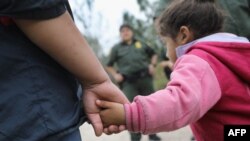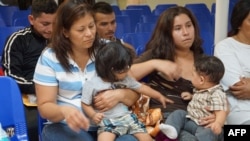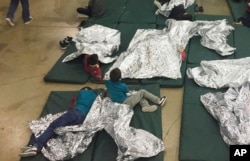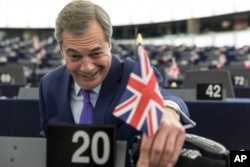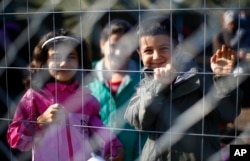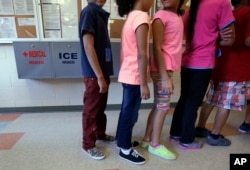Europe and the U.S. have found themselves, since President Donald Trump entered office, at odds on a range of issues from climate change to tariffs and the same holds true when it comes to migration — especially with the handling of migrant children.
The Trump administration’s policy of separating undocumented immigrant children from their parents is provoking not only a mounting furor in the U.S. but also in Europe, where a third of the refugees and migrants who have arrived in the past five years have been children.
“We don’t want what is happening with immigration in Europe to happen with us,” President Trump tweeted Monday. The reverse sentiment is widely shared by Europeans when it comes to government-sanctioned separation of migrant children from their parents, even among some who are critical of open border policies and want tougher action to halt the migrant influx.
Trump’s zero-tolerance enforcement policy, which has resulted in the separation of nearly 2,000 children from their parents in the past six weeks, is drawing a backlash from European lawmakers, rights advocates and religious leaders, who describe the tactic as cruel and inhumane.
But he does have some supporters among nationalist populist politicians.
On Monday Nigel Farage, the former leader of the UK Independence Party and a prominent Brexiter, defended Trump in an exchange on his radio show with an irate Scottish caller, saying that the U.S. president is trying to deter illegal immigration.
He said: “What he is trying to do is to send a message, ‘Don’t come to America illegally.’ It does look very tough. But the alternative is to do what Mrs. Merkel has done and say, ‘anyone can come, who wants to come.’”
But on Tuesday, criticism grew in Europe over the Trump administration's policy, with France’s government spokesman, Benjamin Griveaux, condemning the tactic, saying he did not want to see what is happening in the United States occurring in Europe.
On French television, Griveaux said there was now a major transatlantic moral gap. “We do not share the same model of civilization, clearly we don't share certain values,” he said. Asked about video footage released by the U.S. government showing migrant children held in wire cages and sitting on concrete floors, President Emmanuel Macron’s spokesman said the “images are shocking.”
Many of the children who have been entering Europe are unaccompanied. Last year they numbered 20,000, compared to 13,000 who traveled with at least one parent, according to U.N. figures. Those with their parents are not separated on arrival and European Union policy, in line with U.N. guidelines, emphasizing the need to keep families together as the best, most humane way to protect children and to avoid long-term psychological harm.
Keeping children in detention facilities — with or without parents when it comes to unaccompanied children — has been frowned both by EU and U.N. authorities. They see it as a breach of the U.N. Convention on the Rights of the Child.
But Europe has also struggled with the challenges migrant children pose — although no EU country has pursued a policy of separating children from their parents.
“Detaining children for migration management or asylum reasons — with or without family members is difficult to justify… and clearly not in the child’s best interests,” the European Union Agency for Fundamental Rights said last year in a major report on the legal and policy framework for immigration detention of children.
Last year, the agency warned that “efforts to speed up asylum processing and make returns more effective may prompt an increased use of immigration detention, possibly also affecting children.” It added: “This can entail serious risks of violating children’s right to liberty and security if the strict safeguards protecting children from arbitrary detention are disregarded. Children should be placed in open centers that provide for the necessary protection and care to which they are entitled, and which promote their best interests.”
Spain has been criticized in the past by rights workers for keeping some children in adult immigration detention centers, with or without their parents, pending return to their home countries.
And harsh and illegal treatment has been meted out to unaccompanied children. Last week, Oxfam issued a report, “Nowhere but Out,” in which the charity accused French border police of beating, detaining and forcibly returning to Italy children as young as 12, all in breach of international norms and rules. Other vulnerable migrants have been physically abused, detained and forcibly returned to Italy by French border guards in breach of international norms, Oxfam said on Friday.
The report said children who passed through Ventimiglia, a small town on the border with France, had complained about being “physically and verbally abused, and detained overnight in cells without food, water or blankets and with no access to an official guardian,” all contrary to French and EU law.
The issue of unaccompanied children has been of increasing alarm in Europe. In 2016, Europol, the EU’s police agency, said around 10,000 unaccompanied refugee children had gone missing in Europe in the previous two years, possibly victimized by human traffickers or turned into illegal child laborers.




